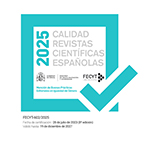¿Qué nos hace vulnerables frente las noticias falsas sobre la COVID-19? Una revisión crítica de los factores que condicionan la susceptibilidad a la desinformación
Resumen
La COVID-19 ha comportado un fuerte incremento de la circulación de noticias falsas, que suponen un peligro potencial para la salud pública. Resulta relevante determinar qué ciudadanos son más vulnerables a este fenómeno y, así, ofrecer elementos para impulsar políticas públicas y campañas de alfabetización digital que prevengan sus consecuencias nocivas. Nuestro objetivo es hacer una revisión crítica de las investigaciones previas que aglutine, de forma comprensiva, los conocimientos ahora dispersos. La muestra la integran 200 artículos publicados entre 2020 y 2021 en revistas indexadas en Web of Science. Los resultados muestran que los jóvenes, las mujeres, las personas menos educadas, los conservadores, los creyentes religiosos, los afectados por problemas de salud mental, los que consumen noticias en medios sociales o quienes más confían en los periodistas son los públicos más vulnerables. Nuestro análisis crítico detecta, además, una serie de retos pendientes para los futuros estudios en este campo.
Descargas
Descarga artículo
Licencia
La revista Estudios sobre el Mensaje Periodístico, para fomentar el intercambio global del conocimiento, facilita el acceso sin restricciones a sus contenidos desde el momento de su publicación en la presente edición electrónica, y por eso es una revista de acceso abierto. Los originales publicados en esta revista son propiedad de la Universidad Complutense de Madrid y es obligatorio citar su procedencia en cualquier reproducción total o parcial. Todos los contenidos se distribuyen bajo una licencia de uso y distribución Creative Commons Reconocimiento 4.0 (CC BY 4.0). Esta circunstancia ha de hacerse constar expresamente de esta forma cuando sea necesario. Puede consultar la versión informativa y el texto legal de la licencia.










